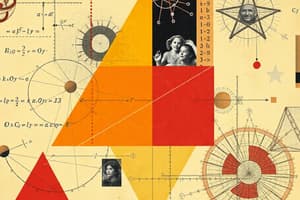Podcast
Questions and Answers
Which branch of mathematics focuses on the properties and relationships of numbers?
Which branch of mathematics focuses on the properties and relationships of numbers?
- Trigonometry
- Arithmetic (correct)
- Geometry
- Statistics
What does calculus primarily study?
What does calculus primarily study?
- Logical structures and reasoning
- Shapes and sizes
- Change and rates of accumulation (correct)
- Collection and interpretation of data
Which concept in mathematics is represented by a relationship between inputs and outputs?
Which concept in mathematics is represented by a relationship between inputs and outputs?
- Statistics
- Equations
- Functions (correct)
- Sets
What is the definition of exponentiation?
What is the definition of exponentiation?
Which branch of mathematics would you study to understand navigation and physics?
Which branch of mathematics would you study to understand navigation and physics?
What is the process of breaking a problem down into smaller parts called?
What is the process of breaking a problem down into smaller parts called?
What type of numbers include whole numbers and their opposites?
What type of numbers include whole numbers and their opposites?
In statistics, what is the main focus of the subject?
In statistics, what is the main focus of the subject?
Flashcards
Mathematics
Mathematics
The study of logic, quantity, and structure using symbolic language.
Arithmetic
Arithmetic
Basic math operations: addition, subtraction, multiplication, and division.
Algebra
Algebra
Using symbols to represent unknowns and relationships.
Geometry
Geometry
Signup and view all the flashcards
Calculus
Calculus
Signup and view all the flashcards
Numbers
Numbers
Signup and view all the flashcards
Problem Solving
Problem Solving
Signup and view all the flashcards
Fundamental Operations
Fundamental Operations
Signup and view all the flashcards
Study Notes
Introduction to Mathematics
- Mathematics is a subject that deals with logic, quantity, and structure.
- It uses symbolic language to represent and solve problems.
- It has applications in many fields, including science, engineering, computer science, and finance.
- Mathematics is often considered a foundational subject for other subjects.
Branches of Mathematics
- Arithmetic: Deals with the basic operations of numbers (addition, subtraction, multiplication, and division).
- Algebra: Studies symbols and the rules for manipulating them to solve equations and relationships.
- Geometry: Focuses on shapes, sizes, and positions of figures in space.
- Calculus: Involves the study of change, including concepts like derivatives and integrals. This is crucial for understanding rates of change and accumulation.
- Trigonometry: Studies the relationships between angles and sides of triangles. Critically important in navigation and physics.
- Statistics: Deals with data collection, analysis, interpretation, and presentation. Understanding variability and probability are central.
- Discrete Mathematics: Deals with countable or discrete structures, including logic, sets, combinatorics, and graph theory.
Key Concepts in Mathematics
- Numbers: Real numbers, integers, rational numbers, irrational numbers, complex numbers, and their properties.
- Sets: Groupings of objects, and operations between them.
- Functions: Relationships between inputs and outputs, often expressed as formulas or graphs.
- Equations: Statements of equality, solved to find unknown values.
- Inequalities: Statements of relationships like greater than or less than.
- Proofs: Logical arguments used to demonstrate mathematical truths.
Fundamental Operations
- Addition: Combining quantities.
- Subtraction: Finding the difference between quantities.
- Multiplication: Repeated addition.
- Division: Finding how many times one quantity is contained within another.
- Exponentiation: Repeated multiplication.
- Roots: Finding the value that, when multiplied by itself a certain number of times, gives a particular result.
Problem Solving Strategies
- Identify the problem: Carefully understand what is being asked.
- Analyze the problem: Break the problem down into smaller parts.
- Develop a solution: Choose appropriate strategies, like formulas, diagrams, or logical reasoning.
- Evaluate the solution: Check the work to ensure accuracy.
Applications of Mathematics
- Science: Used for describing natural phenomena, modeling experiments, and making predictions.
- Engineering: Essential for designing structures, creating machines, and developing technologies.
- Computer Science: Forms the basis for algorithms, data structures, and programming languages.
- Finance: Used for calculating investments, managing risk, and optimizing financial strategies.
Mathematical Tools
- Calculators: Useful for performing complex calculations quickly and efficiently.
- Graphing software: Helps visualize relationships between variables and solve problems graphically.
- Computer algebra systems: Allow for symbolic manipulation and calculations with complex mathematical expressions.
Studying That Suits You
Use AI to generate personalized quizzes and flashcards to suit your learning preferences.




